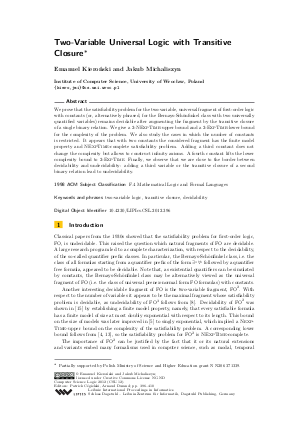Two-Variable Universal Logic with Transitive Closure
Authors Emanuel Kieronski, Jakub Michaliszyn
-
Part of:
Volume:
Computer Science Logic (CSL'12) - 26th International Workshop/21st Annual Conference of the EACSL (CSL 2012)
Part of: Series: Leibniz International Proceedings in Informatics (LIPIcs)
Part of: Conference: Computer Science Logic (CSL) - License:
 Creative Commons Attribution-NonCommercial-NoDerivs 3.0 Unported license
Creative Commons Attribution-NonCommercial-NoDerivs 3.0 Unported license
- Publication Date: 2012-09-03
File

PDF
LIPIcs.CSL.2012.396.pdf
- Filesize: 465 kB
- 15 pages
Document Identifiers
Subject Classification
Keywords
- two-variable logic
- transitive closure
- decidability
Metrics
- Access Statistics
-
Total Accesses (updated on a weekly basis)
0Document
0Metadata
Abstract
We prove that the satisfiability problem for the two-variable, universal fragment of first-order logic with constants (or, alternatively phrased, for the Bernays-Schönfinkel class with two universally quantified variables) remains decidable after augmenting the fragment by the transitive closure of a single binary relation. We give a 2-NExpTime-upper bound and a 2-ExpTime-lower bound for the complexity of the problem. We also study the cases in which the number of constants is restricted. It appears that with two constants the considered fragment has the finite model property and NExpTime-complete satisfiability problem. Adding a third constant does not change the complexity but allows to construct infinity axioms. A fourth constant lifts the lower complexity bound to TwoExpTime. Finally, we observe that we are close to the border between decidability and undecidability: adding a third variable or the transitive closure of a second binary relation lead to undecidability.
Cite As Get BibTex
Emanuel Kieronski and Jakub Michaliszyn. Two-Variable Universal Logic with Transitive Closure. In Computer Science Logic (CSL'12) - 26th International Workshop/21st Annual Conference of the EACSL. Leibniz International Proceedings in Informatics (LIPIcs), Volume 16, pp. 396-410, Schloss Dagstuhl – Leibniz-Zentrum für Informatik (2012)
https://doi.org/10.4230/LIPIcs.CSL.2012.396
BibTex
@InProceedings{kieronski_et_al:LIPIcs.CSL.2012.396,
author = {Kieronski, Emanuel and Michaliszyn, Jakub},
title = {{Two-Variable Universal Logic with Transitive Closure}},
booktitle = {Computer Science Logic (CSL'12) - 26th International Workshop/21st Annual Conference of the EACSL},
pages = {396--410},
series = {Leibniz International Proceedings in Informatics (LIPIcs)},
ISBN = {978-3-939897-42-2},
ISSN = {1868-8969},
year = {2012},
volume = {16},
editor = {C\'{e}gielski, Patrick and Durand, Arnaud},
publisher = {Schloss Dagstuhl -- Leibniz-Zentrum f{\"u}r Informatik},
address = {Dagstuhl, Germany},
URL = {https://drops.dagstuhl.de/entities/document/10.4230/LIPIcs.CSL.2012.396},
URN = {urn:nbn:de:0030-drops-36860},
doi = {10.4230/LIPIcs.CSL.2012.396},
annote = {Keywords: two-variable logic, transitive closure, decidability}
}
